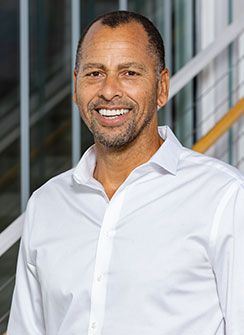
The Community Foundation of South Jersey (CFSJ) wants our neighbors to know board members for their leadership and generosity. We asked board members a few questions to get to know them and learn about the values that drive their work.
Dr. Atkins has spent his adulthood trying to improve the health and well-being of vulnerable children and families living in distressed, urban neighborhoods through service, scholarship, and education. Through his scholarly work and practice, Dr. Atkins has become a leader in shaping the policy and practice that influences the health and well-being of vulnerable populations living in high poverty neighborhoods. He has authored and co-authored in journals ranging from Research in Nursing and Health to Psychological Science, to the Journal of Public Health Dentistry. He has discussed his practice and research locally and nationally, and since 2006 has been honored more than a dozen times for his teaching and community service work.
Dr. Atkins lives in Collingswood, New Jersey and serves as Executive Vice Dean for the School of Nursing at Johns Hopkins University-Baltimore, and ongoing Interim Dean of the College of Arts and Sciences at Rutgers University-Camden. He grew up in Cherry Hill and moved to Camden in his early 20s where he worked as a school nurse. He appreciates the diversity of people and places in the South Jersey area and enjoys being involved with local philanthropy through CFSJ.
What brings you joy or makes you experience gratitude?
My family brings me joy. I am one of six and I have the privilege of being close to my siblings and my many nephews and nieces.
What characteristics do you want to instill in children?
I want them to experience the joy of connecting to others and making meaningful contributions locally and globally. It’s hard to be sad when you are doing for others.
What is your aspiration for your philanthropy?
Philanthropy should lean into its obligations to serve communities of greatest disinvestment. When philanthropic organizations are willing to take risks and share what they learn from their successes and failures, they can help transform lives for the better.
